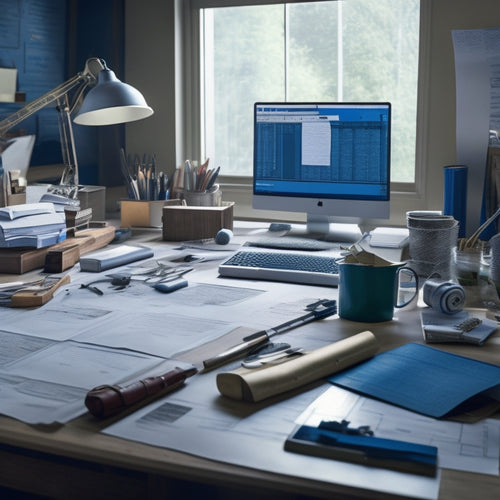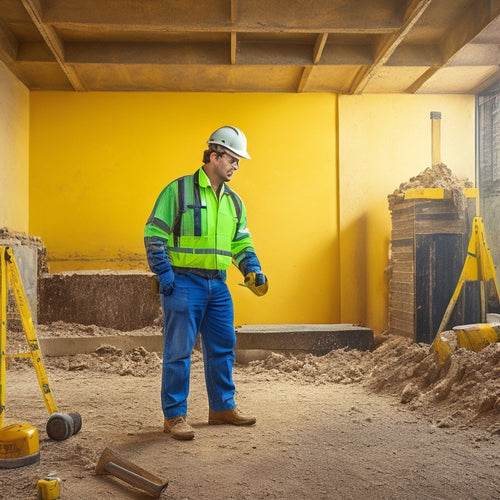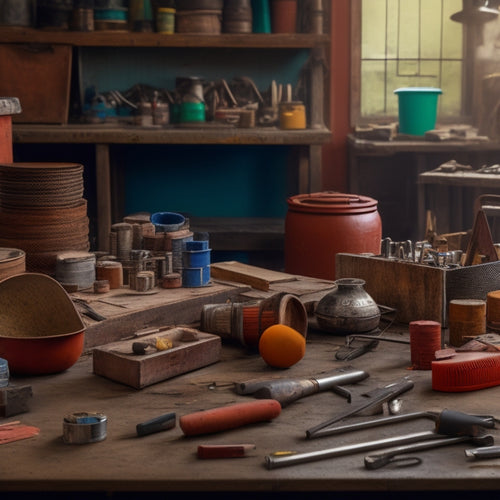
3 Best Tools for Seamless Home Renovation Inspection
Share
When planning a seamless home renovation, you need to identify potential issues early on to avoid costly surprises down the line. You'll want to equip yourself with the right tools to guarantee a thorough inspection. Start with a thermal imaging camera to visualize temperature differences and detect energy losses, moisture intrusion, and electrical issues. Next, use a moisture meter to measure moisture levels in building materials and identify water damage, leaks, and condensation issues. Finally, utilize a concrete crack filling tool to assess the severity of cracks in foundations and walls. By leveraging these essential tools, you'll gain a detailed understanding of your property's condition and set yourself up for a successful renovation - and that's just the beginning.
Key Takeaways
• A thermal imaging camera is essential for detecting temperature differences, energy losses, and moisture intrusion during home renovation inspections.
• A moisture meter is necessary for measuring moisture levels in building materials to identify water damage, leaks, and condensation issues.
• A concrete crack filling tool is vital for assessing the severity of cracks in foundations and walls, ensuring proper filling techniques are used.
• Advanced inspection technology options like drone inspections, acoustic sensors, and thermal imaging cameras provide a comprehensive view of a property's condition.
• Non-invasive technology and thorough report creation help identify potential issues early, saving time and reducing renovation costs.
Essential Inspection Tools Overview
During a home renovation inspection, you'll need a range of essential tools to accurately assess the property's condition and identify potential issues. These tools will help you detect hidden problems, saving you time and money in the long run.
A thermal imaging camera is a must-have, allowing you to visualize temperature differences that can indicate energy losses, moisture intrusion, or electrical issues. This non-invasive technology helps you pinpoint areas that require further investigation.
Another crucial tool is a moisture meter, which measures the moisture levels in building materials. This helps you identify water damage, leaks, or condensation issues that can lead to mold growth or structural damage.
By using these tools, you'll be able to create a thorough report outlining the property's condition and providing recommendations for necessary repairs or improvements.
With the right tools, you'll feel confident in your ability to identify potential issues and create a successful renovation plan that meets your needs and budget.
Concrete Crack Filling Tool Inspection
You'll also want to inspect the concrete foundation and walls for cracks, using a concrete crack filling tool to assess the severity of these imperfections. This tool is essential for identifying cracks that require immediate attention, as well as those that can be addressed later in the renovation process.
During the inspection, pay close attention to the width, depth, and length of the cracks, as these factors will influence your crack assessment and subsequent filling techniques.
When evaluating the cracks, consider the type of concrete used, its age, and any environmental factors that may have contributed to the damage. This information will help you determine the most effective filling method and materials to use. For instance, epoxy-based fillers are suitable for structural cracks, while polyurethane-based fillers are better suited for non-structural cracks.
Remember to carefully follow the manufacturer's instructions for the concrete crack filling tool and filling materials to guarantee a successful repair.
Advanced Inspection Technology Options
With the concrete foundation and walls inspected, it's time to leverage advanced inspection technology options, such as thermal imaging cameras, moisture meters, and acoustic sensors, to uncover hidden defects and anomalies that may not be visible to the naked eye.
You'll want to take into account the following advanced inspection tools to guarantee a thorough renovation inspection:
| Tool | Description |
|---|---|
| Thermal Imaging Cameras | Utilize infrared technology to detect temperature anomalies, identifying potential issues with insulation, electrical, and plumbing systems |
| Drone Inspections | Employ aerial drones equipped with high-resolution cameras to inspect rooftops, chimneys, and hard-to-reach areas |
| Acoustic Sensors | Detect sounds inaudible to the human ear, allowing you to identify leaks, cracks, and other hidden defects |
| Moisture Meters | Measure moisture levels in building materials, helping you identify water damage, mold, and structural issues |
Frequently Asked Questions
How Do I Prioritize Repairs Based on Inspection Results?
When you're faced with a list of inspection results, prioritize repairs by evaluating the repair urgency and cost estimation for each issue.
You'll want to tackle critical safety hazards and structural damages first, followed by functional and cosmetic repairs.
Create a spreadsheet to categorize and rank each task, considering factors like immediate risk, long-term consequences, and budget impact.
Can I Perform a Home Renovation Inspection Myself?
You're wondering if you can perform a home renovation inspection yourself.
While it's possible, it's essential to be aware of common inspection mistakes that can lead to costly oversights.
To guarantee a thorough DIY inspection, follow expert tips, such as creating a detailed checklist, inspecting during the day, and taking notes and photos.
Be cautious of hidden defects and don't hesitate to consult a professional if you're unsure about any findings.
What Is the Average Cost of a Professional Home Inspection?
When you're considering hiring a professional for your home renovation inspection, you're probably wondering what it'll cost.
The average cost of a professional home inspection varies, but expect to pay between $300 and $1,000, depending on the inspector's qualifications, location, and services offered.
Be sure to research inspection pricing in your area and look for inspectors with certifications from reputable organizations, like ASHI or InterNACHI, to guarantee you're getting a thorough and accurate assessment.
How Long Does a Typical Home Renovation Inspection Take?
You're likely wondering how long a typical home renovation inspection takes.
Research suggests that the average inspection timeline can vary greatly, depending on the size and complexity of the renovation project. Generally, you can expect a thorough inspection to take anywhere from a few hours to several days.
To guarantee a smooth renovation planning process, it's crucial to factor in this timeframe and allocate sufficient time for the inspection, allowing you to identify potential issues and make informed decisions.
Are Home Renovation Inspections Required by Law in My State?
You're wondering if home renovation inspections are required by law in your state.
The answer is, it depends on your state's legal requirements. You'll need to research your state regulations to determine if an inspection is mandatory.
Some states, like California, require inspections for certain types of renovations, while others may not.
You can check with your local government or a licensed contractor to get the specifics on what's required in your area.
Conclusion
As you wrap up your home renovation inspection, remember that a solid foundation is like a strong anchor - it holds everything together.
With the right tools, you've secured a sturdy anchor, ensuring a seamless renovation process.
The concrete crack filling tool, advanced technology options, and essential inspection tools are the pillars that fortify your project, preventing costly surprises and ensuring a dream home that stands the test of time.
Related Posts
-

Create a Home Renovation Project Timeline in Excel
You can create a detailed home renovation project timeline in Excel by setting up a tailored template with separate w...
-

5 Vital Safety Tips for DIY Renovation Success
When tackling a DIY renovation, you'll need to prioritize safety above all else. Start by protecting yourself from fl...
-

Budget-Friendly Materials for Your Home Renovation Needs
As you initiate your home renovation, you're enthusiastic to find budget-friendly materials that fit your vision with...


